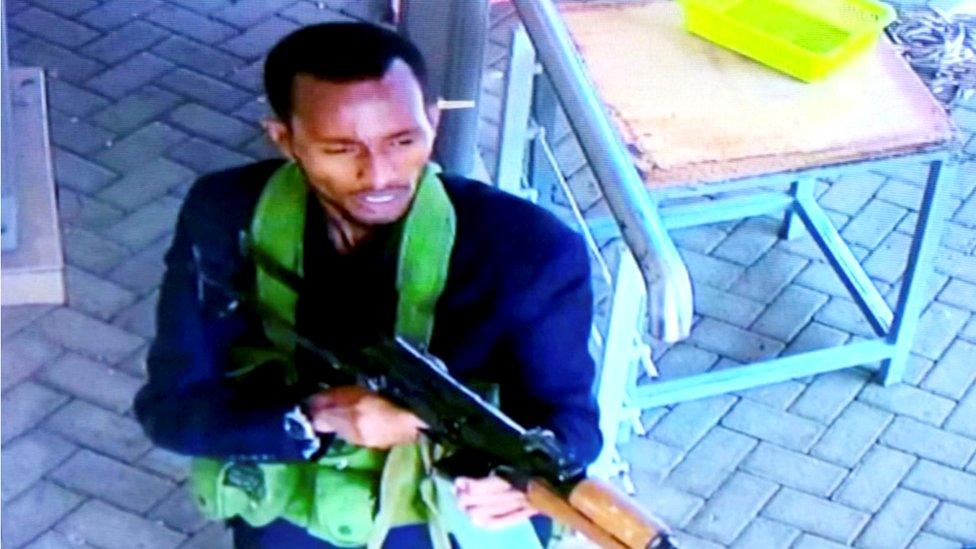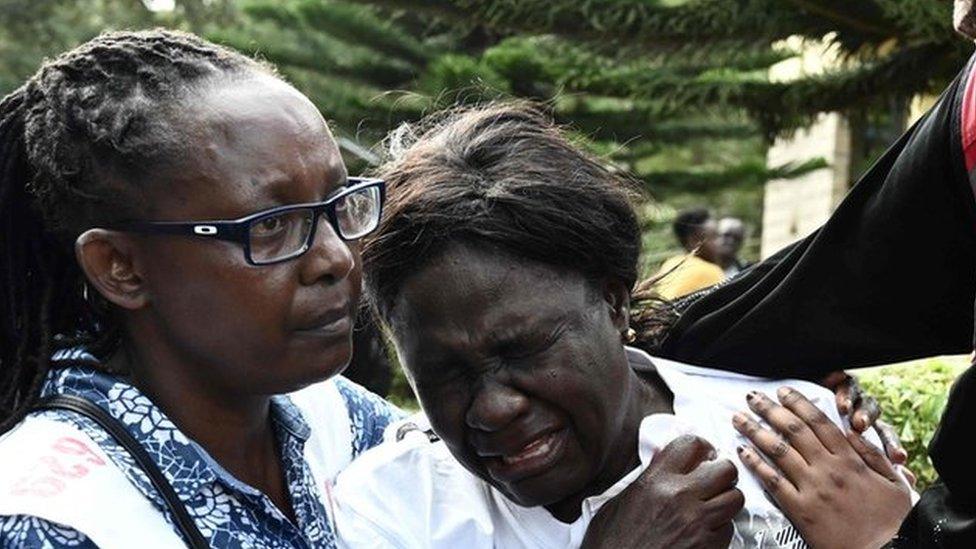Kenya hotel attack: Luke Potter named as Briton killed
- Published

Luke Potter was involved in development projects across East Africa
A British man killed in an attack on a hotel in Nairobi, Kenya, has been named as Luke Potter by the international development charity he worked for.
In a statement, external, Gatsby said it was "shocked and saddened" by the death of its Africa programmes director.
Mr Potter was among at least 21 people killed. It is understood a member of the UK Special Forces was involved in a rescue operation at the complex.
The Somalia-based militant group al-Shabab said it was behind the attack.
Gunmen stormed the complex in the capital on Tuesday. Gunfire and explosions continued into Wednesday before President Uhuru Kenyatta announced the siege had ended.
The Foreign Office said another Briton was also wounded in the attack.
In a statement, Gatsby Africa said Mr Potter had "devoted the past 10 years of his career to helping some of the poorest and most vulnerable people in the world" and had worked with the charity for more than three years, carrying out assignments across East Africa.
"Luke was respected by all he worked with, bringing huge drive, determination, a relentless work ethic, and a thirst for new ideas to every project," the statement said.
"He brought a calm head and his unique sense of humour to every situation."
It said Mr Potter was "instrumental" in establishing the organisation's forestry programme in Kenya and provided "crucial leadership, guidance and support" to other programmes in Tanzania and Rwanda.
The charity said its "thoughts and deepest condolences" were with Mr Potter's family, partner, daughter and friends and they were offering support to them and their own staff.
The scene at the Nairobi Dusit hotel as the rescue operation took place
The UK High Commissioner to Kenya, Nic Hailey, confirmed the death of a British man on Twitter.
"I'm very sad to confirm that we believe at least one British national has been killed in the attack," he said.
"We are providing our support to his family and friends at this very difficult time."
The Foreign Office added it was "in contact with the Kenyan authorities" and was "ready to help any other British people affected".
It is understood a member of the British SAS - who was in Kenya as part of a training team - was involved in rescuing hostages.
The armed special forces soldier entered the hotel complex to help rescue the trapped civilians and, according to a source, fired his weapon.
He is believed to have been working alongside members of the US Special Forces, who were already in Nairobi when the attack took place.

A man believed to be a member of the British SAS helps people caught up in the attack to safety
Foreign Secretary Jeremy Hunt said on Twitter: "Really tragic news from Kenya - my thoughts are with the families and friends who have lost loved ones in this attack including one British citizen.
"UK stands with Kenya at this difficult time. Our team in Nairobi are supporting all Brits affected."
On Wednesday morning, President Kenyatta announced the assault was over, adding that the "terrorists" had been "eliminated" and more than 700 civilians had been evacuated to safety.
He said: "We will seek out every person that was involved in the funding, planning and execution of this heinous act.
"We are a country governed by laws, rules and regulations - a country that embraces peaceful coexistence... I must also state that we are also a nation that never forgets those who hurt our children."
The president said 14 "innocent" people had been killed in the attack.
Kenya's police chief later said the death toll had risen to 21. The Kenya Red Cross said about 45 people were still unaccounted for.
The US State Department said an American man was among those killed.

The luxury complex, which houses the DusitD2 hotel as well as offices, is in the Westlands district of the city.
The attack began at about 15:00 local time (12:00 GMT) on Tuesday, when four gunmen threw bombs at vehicles in the car park, before entering the lobby, where one blew himself up, police say.
Security camera footage showed at least four heavily armed men walking in and opening fire. There are reports they had been seen visiting the compound in recent days.
When the gunmen first entered the complex there was confusion, as people first tried to escape to freedom and then retreated into the building as they came under fire.
Many civilians remained holed up in the complex for several hours, as they hid from the attackers in bathrooms, and even under tables and chairs.
Groups of civilians were escorted to safety by security forces throughout the night.
In the early hours of Wednesday, more than 100 people were rescued. About 30 people are being treated at Nairobi hospitals, media reports say.
- Published16 January 2019

- Published16 January 2019
